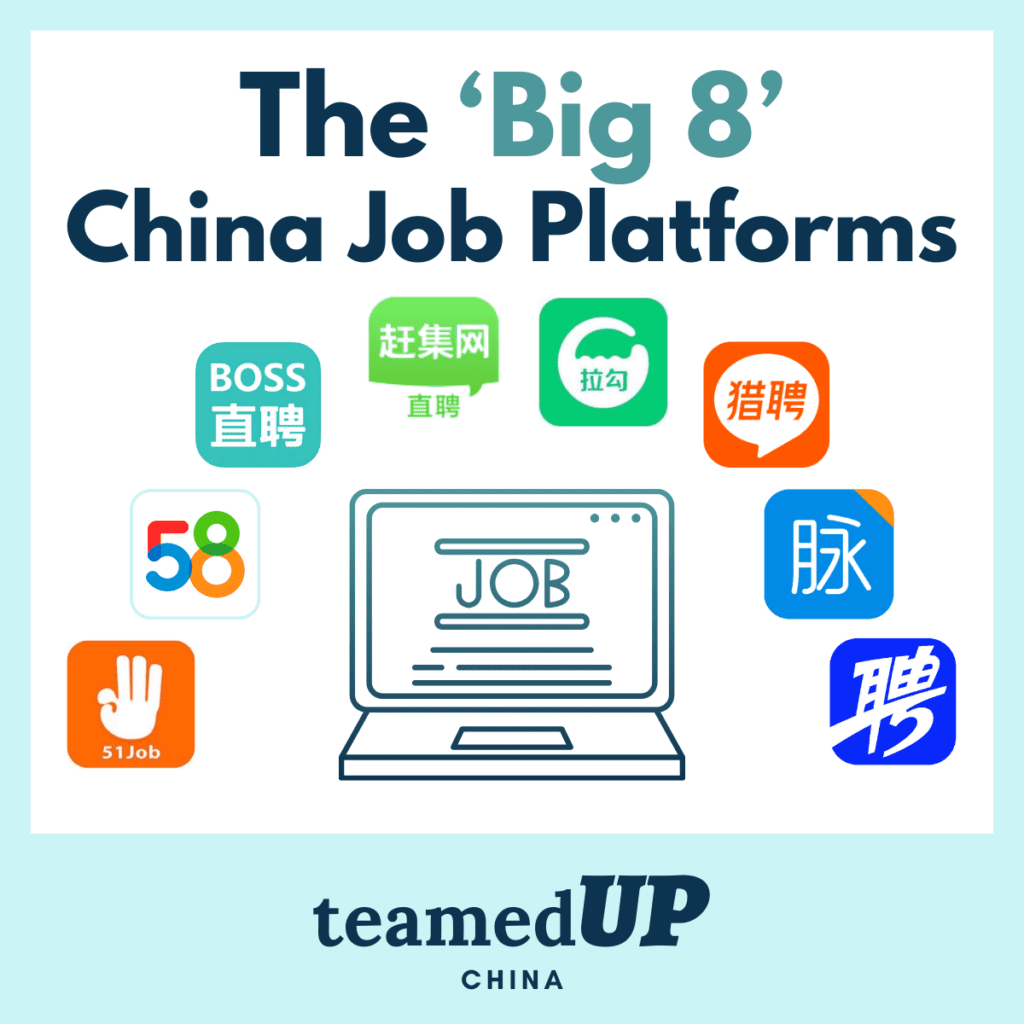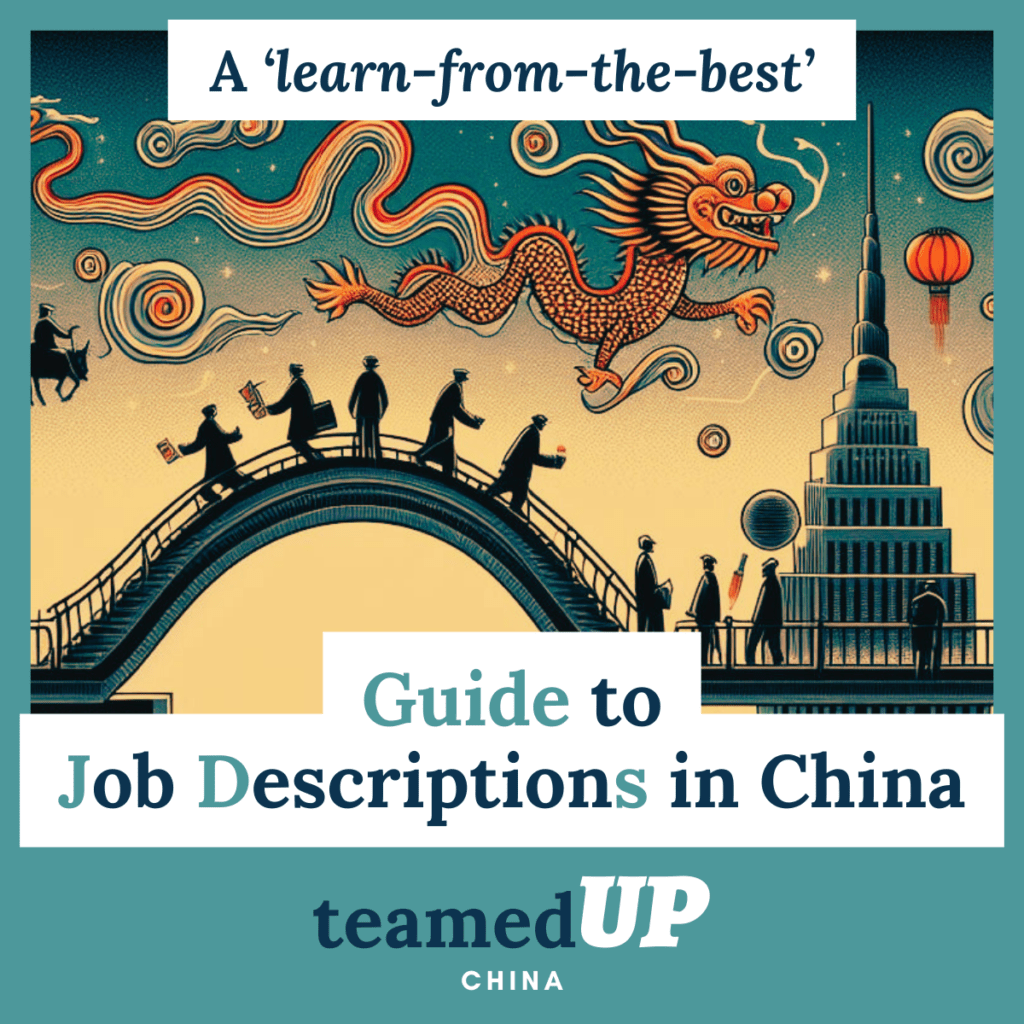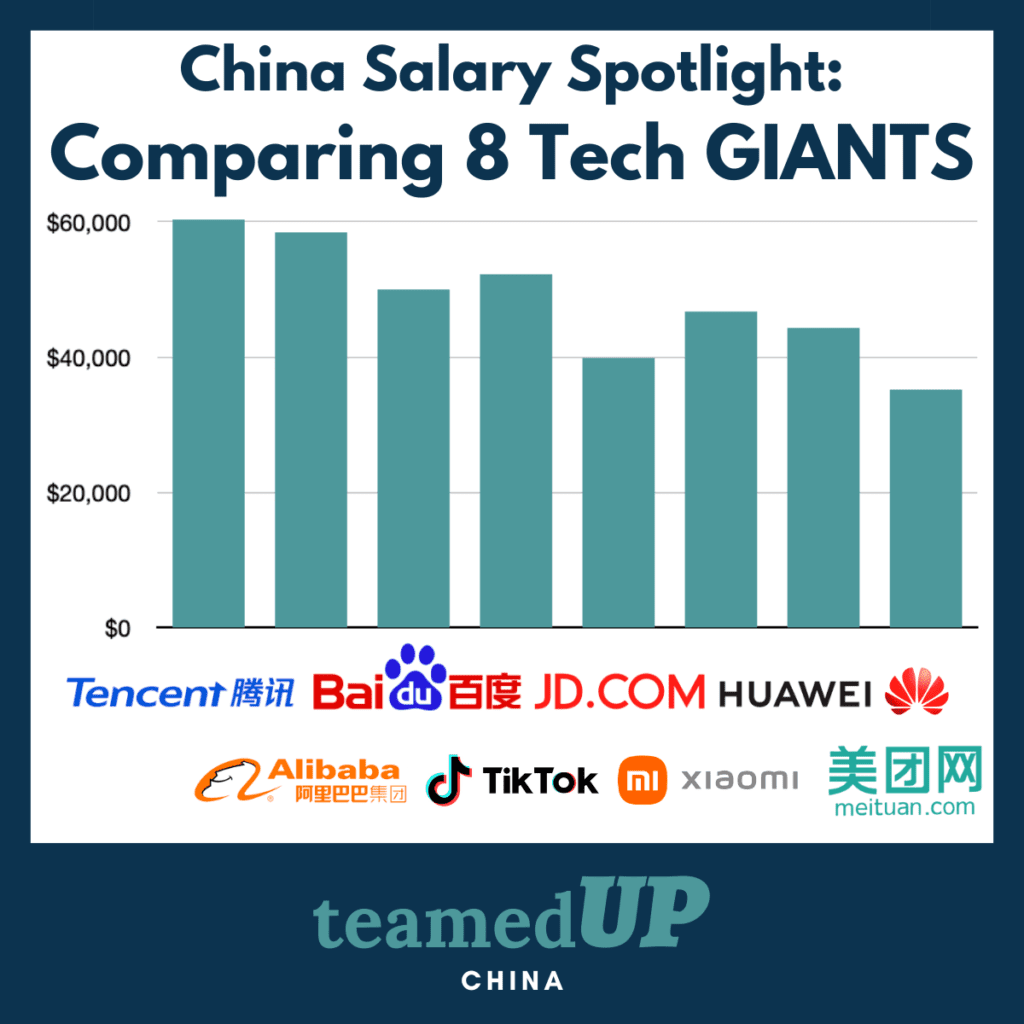The 8 Most Popular Job Platforms in China
China boasts the world’s largest domestic job market, yet many of its leading recruitment platforms remain relatively unknown outside the country. These powerhouses rival global names like LinkedIn, Indeed, Monster, CareerBuilder, and ZipRecruiter in both user numbers and revenue generation. Furthermore, most of these international HR giants hardly operate in China. So let’s dive into the biggest, most used job platforms in China! For each platform, we’ll list: Company Website Year Founded Key Milestones User & Growth Stats Platforms are listed alphabetically. Hiring in China? We can help. The ‘Big 8’ Job Platforms in China #1 51job (前程无忧 qiánchéng wú yōu) Website: https://51job.com Year Founded: 1998 Key Milestones: 1998: 51job’s Founding Rick Yan and Kathleen Chien found the company, with its headquarters in Shanghai. The original goal was to provide a platform for job seekers and employers to connect online. 2004: Initial Public Offering (IPO) In December 2004, the company went public on the NASDAQ stock exchange under the ticker symbol “JOBS.” This move helped the company raise capital to support its growth and expansion. 2005: Expansion of Regional Offices To extend its reach across China, the organization expanded its operations by establishing regional offices in key cities like Beijing, Guangzhou, and Shenzhen. This expansion allowed the company to better serve job seekers and employers nationwide. 2006: Launch of 51job University Launched “51job University,” an initiative to provide professional training and development programs for job seekers. This service aimed to enhance job seekers’ skills and increase their competitiveness in the job market. 2011: Acquisition of HR Solutions Provider In October 2011 they acquired HR Solutions, a company specializing in recruitment outsourcing and human resources services. This acquisition expanded 51job’s portfolio of services, allowing it to offer a broader range of solutions to its clients. 2014: Introduction of Mobile Apps Introduced mobile apps for iOS and Android platforms. These apps enabled job seekers to search and apply for jobs conveniently using their smartphones. 2015: Acquisition of Yingjie Sheng In April 2015 the firm bought Yingjie Sheng, a fast-growing job and internship site focused on recent college grads. 2017: Strategic Investment in Lagou In September 2017 the company announced that it would invest USD $120 million in Lagou to obtain a 60% stake in the company. Lagou is a leading job platform in China focused on the IT sector. 2018: Strategic Partnership with WeChat In June 2018, the company entered into a strategic partnership with WeChat, a popular messaging and social media platform in China. This collaboration aimed to enhance the recruitment experience by integrating 51job’s services with WeChat’s extensive user base. 2022: 51job is Taken Private ‘JOBS’ is delisted from the NASDAQ through a merger with Garnet Faith Limited, in a deal valued at around USD $4.3 billion. User and Growth Stats: 51job’s growth since launching in 1998 has been solid and steady. Since going public in 2004, the company has publicly filed key figures on their growth. Here a few of those highlights: Annual Revenues have gone from RMB479.9 million (US$58.0 million) in 2004 to RMB4,420.4 million (US$693.7 million) in 2021, growing to nearly 11 times over! Total User Base had grown to 155 million by 2021. Monthly Active Users (MAU) has grown to nearly 20 million as of December 2022. In comparison, global HR giant ZipRecruiter has roughly 25 million MAU. Active CV Database had grown to over 142 million by 2020. Figures as of 5/2020 References and Further Info: Our full article on 51job: 51job (前程无忧): A Look at the Leading Chinese Job Site Market Screener: https://www.marketscreener.com/quote/stock/51JOB-INC-9784/news/51job-Inc-acquired-Yingjiesheng-com-for-CNY-250-million-38283555/ Seeking Alpha: https://seekingalpha.com/article/4350254-51job-despite-short-term-pain-long-run-perspectives-look-bright Crunchbase: https://www.crunchbase.com/organization/51job China News: https://www.chinanews.com.cn/cj/2017/12-20/8405156.shtml Paul Weiss: https://www.paulweiss.com/practices/transactional/private-equity/news/dcp-capital-acquires-china-s-51job-in-take-private-deal-valued-at-43-billion?id=43047 PRNewswire: https://www.prnewswire.com/news-releases/51job-inc-announces-the-establishment-of-51job-university-56453782.html Xueqiu: https://xueqiu.com/2287778230/179182343 AIM Group: https://aimgroup.com/2019/11/15/51job-backs-huali-university-cdp-holdings-in-mixed-q3/ Statista: https://www.statista.com/statistics/1211995/china-leading-hiring-apps-based-on-monthly-active-users/ Wikipedia: https://zh.wikipedia.org/wiki/%E5%89%8D%E7%A8%8B%E6%97%A0%E5%BF%A7#cite_note-7 #2 58 (58同城 wǔbā tóngchéng) Website: https://58.com Year Founded: 2005 Key Milestones / User and Growth Stats: 2005: Yao Jinbo founds 58.com in Beijing. He still serves as the CEO as of 2023. 2007: The company thrives via a simple classifieds model. Throughout the year it sets up office branches in Tianjin, Shanghai, Shenzhen, and Guangzhou. The team builds out localized websites for more than 160 cities across the country. 2009: Registered users surpass 100 million! 2011: Chinese celebrity Yang Mi becomes the first celebrity spokesperson for 58.com – beginning a years-long relationship between the two. This event ushers in an era of massive marketing and national brand recognition for the platform. 2013: 58.com was officially listed on the New York Stock Exchange (symbol: ‘WUBA’), raising $187 million USD in the process. 2014: Strategic investments and acquisitions. In 2014, 58.com began deploying its capital in a significant way. Highlights for the year include investments in eDaijia (e代驾, Real Estate), Momo (陌陌, Social Media and Dating), Baojia (宝驾租车, Car Rental), and purchase of Charm 91 (购魅力91, Recruitment). 2015: Two giants merge (and more acquisitions). In April, 58.com announces a strategic investment and merger with Ganji, their biggest competitor and second-largest classifieds portal in China at the time. Founder CEO Yao Jinbo refers to the former rivalry between 58 and Ganji as “the most intense on the Internet.” Throughout the rest of the year, the newly formed 58 Group acquires other service giants Anjuke (安居客, Real Estate), ChinaHR (中华英才网, Human Resources), Jxedt.com (驾校一点通, Transportation and Licensing), and invests in Tubatu (土巴兔装修网, Home Decoration). 2018: In a widely promoted partnership, 58 launches its WeChat App and secures a $200 million USD investment from Tencent for its newly launched University-focused platform ZhuanZhuan (转转, Recruitment & Second-Hand Services). The company reports adding 100 million users in 2018 alone. 2020: A group of investors including Warburg Pincus Asia LLC, General Atlantic Singapore Fund Pte Ltd, Ocean Link Partners Ltd, Founder/CEO Jinbo Yao, and Internet Opportunity Fund LP (an entity controlled by Yao) take 58 private off of the NYSE. The deal values the company at about $8.7 billion USD. 2022: The Ganji brand is changed from ‘Gangji Web’ (赶集网 Gǎnjí wǎng) to ‘Ganji Recruit’ (赶集直招 Gǎnjí zhí zhāo). The intent is to refocus the brand from general classifieds to recruitment and jobs. References and Further Info: Our full









